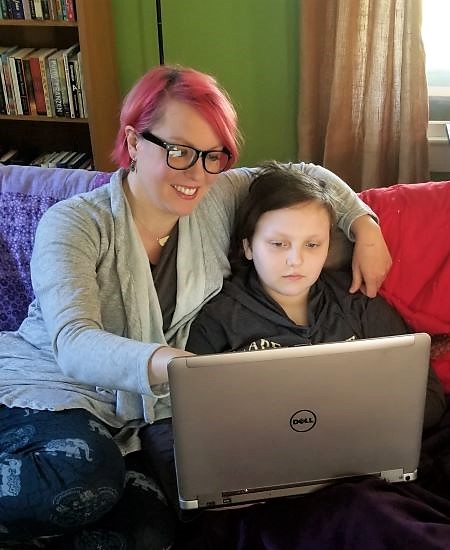
Thursday, April 16, 2020
Editor’s note: For many college faculty members, teaching online brought on by the COVID-19 pandemic is a new frontier. Here is an essay from the frontlines.
By Amy Hagenrater-Gooding
It’s 8 a.m., the designated posting time for my younger son’s online work. He has been up since 6:30 a.m. and we are writing a narrative story, certainly within my wheelhouse. Ten-year-old boys stuck inside for four weeks, however, are more interested in creating “stories” in Minecraft and Fortnite than in writing about their adventures during quarantine.
After some brief drafting, Griffin writes an essay about playing with his sister and one “epic battle” on Fortnite. Quarantine has limited not only our socializing, but apparently our plot points as well…
When he proceeds to submit his essay, there is no link to do so. He sighs, exasperated, but emails his teacher. She responds quickly. He sees the link, clicks to submit and receives the notice “submissions aren’t being accepted at this time.” With the battle-fatigued exhaustion only youth can muster, Griffin looks at me and says, “Your generation really needs to figure out technology!”
My generation? I didn’t want to remind him that only last week I showed him how to use Flip Grid.
In the best of circumstances, teaching presents a gulf.
In my drama class this week, we finished David Mamet’s Oleanna, an exploration of the divide between teacher and student. Beyond the play’s conflict, I watched as my students submitted their Flip Grid videos on subways wearing masks, in a quiet corner of their job and from their bedrooms at their parents’ homes with vacuums and siblings riotously echoing in the backgrounds.

We discussed the play’s setting: a college. The film adaptation (which they could watch via Kast) opens up on a campus much like UMES. Imagine: the manicured stretch of the quad, the columned buildings, flags fluttering in the wind. Can’t you feel the sun and hear the students laughing as they walk to class?
This is not that. Our setting is likely a home with too much family, maybe too many pets, and too many worries. Likely there is not enough certainty about the days to come and probably intermittent internet. Our own “links” are probably not working.
What is like the play is the focus on implicit lessons. Sure I’m hoping my students will remember tenets of drama. Griffin’s teachers want him to remember elements of composition. But more than that, what are the implicit lessons we are learning about ourselves and our students?
I have learned that the baseball player in my class works evenings at a grocery store, finishing his degree and serving as a front-line worker during a pandemic. (A PANDEMIC!) One of my seniors cares for the children of healthcare workers while applying to grad school. In short, we are doing amazing things. We are broken, but working, sometimes limping, sometimes thriving, and if our greatest accomplishment is beating a sibling at an online video game or reading a chapter for class, that’s enough.
There is no “my” generation and there isn’t just an exclusively “your” problem; if we learn anything from online teaching, from online learning, from online living during a pandemic (A PANDEMIC!) it’s that empathy must be cultivated, communication must persist and we must be present. Even if it is through a screen, remind yourself you are here. Remind your students, too. Sometimes that is more than enough.
Dr. Hagenrater-Gooding is an associate professor in the Department of English & Modern Languages, where she teaches Modern Drama, World Literature and Novel: East & West.

